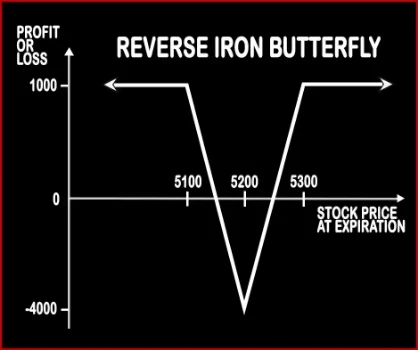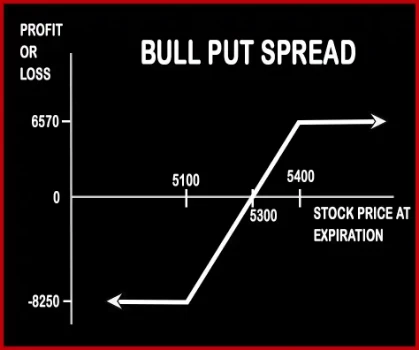Compare Strategies
| REVERSE IRON BUTTERFLY | BULL PUT SPREAD | |
|---|---|---|

|

|
|
| About Strategy |
Reverse Iron Butterfly Option StrategyReverse Iron Butterfly as the name suggests is the opposite of Iron Butterfly. In Reverse Iron Butterfly, a trader is bullish on volatility and expects the market to make significant move in the near future in either directions. Here a trader will buy 1 ATM Call Option, sell 1 OTM Call Option, buy 1 ATM Put Option, sell 1 OTM Put Option. This strategy also bags lim |
Bull Put Spread Option StrategyBull Put Spread option trading strategy is used by a trader who is bullish in nature and expects the underlying asset to move in an upward trend in the near future. This strategy includes buying of an ‘Out of the Money’ Put Option and selling of ‘In the Money’ Put Option of the same underlying asset and the same expiration date. When you write a Put, you will receive prem .. |
REVERSE IRON BUTTERFLY Vs BULL PUT SPREAD - Details
| REVERSE IRON BUTTERFLY | BULL PUT SPREAD | |
|---|---|---|
| Market View | Neutral | Bullish |
| Type (CE/PE) | CE (Call Option) + PE (Put Option) | PE (Put Option) |
| Number Of Positions | 4 | 2 |
| Strategy Level | Advance | Advance |
| Reward Profile | Limited | Limited |
| Risk Profile | Limited | Limited |
| Breakeven Point | Upper Breakeven Point = Strike Price of Long Call + Net Premium Paid, Lower Breakeven Point = Strike Price of Long Put - Net Premium Paid | Strike price of short put - net premium paid |
REVERSE IRON BUTTERFLY Vs BULL PUT SPREAD - When & How to use ?
| REVERSE IRON BUTTERFLY | BULL PUT SPREAD | |
|---|---|---|
| Market View | Neutral | Bullish |
| When to use? | This strategy is used when a trader is bullish on volatility and expects the market to make significant move in the near future in either directions. | Bull Put Spread strategy is used when you're of the view that the price of a particular underlying will rise, move sideways, or marginally fall. |
| Action | Sell 1 OTM Put, Buy 1 ATM Put, Buy 1 ATM Call, Sell 1 OTM Call | Buy OTM Put Option, Sell ITM Put Option |
| Breakeven Point | Upper Breakeven Point = Strike Price of Long Call + Net Premium Paid, Lower Breakeven Point = Strike Price of Long Put - Net Premium Paid | Strike price of short put - net premium paid |
REVERSE IRON BUTTERFLY Vs BULL PUT SPREAD - Risk & Reward
| REVERSE IRON BUTTERFLY | BULL PUT SPREAD | |
|---|---|---|
| Maximum Profit Scenario | Strike Price of Short Call (or Long Put) - Strike Price of Long Call (or Short Put) - Net Premium Paid - Commissions Paid | Max Profit = Net Premium Received |
| Maximum Loss Scenario | Net Premium Paid + Commissions Paid | Max Loss = (Strike Price Put 1 - Strike Price of Put 2) - Net Premium Received |
| Risk | Limited | Limited |
| Reward | Limited | Limited |
REVERSE IRON BUTTERFLY Vs BULL PUT SPREAD - Strategy Pros & Cons
| REVERSE IRON BUTTERFLY | BULL PUT SPREAD | |
|---|---|---|
| Similar Strategies | Short Put Butterfly, Short Condor | Bull Call Spread, Bear Put Spread, Collar |
| Disadvantage | • Potential loss is higher than gain, complex strategy. • Not suitable for beginners. | • Limited profit potential. • In loss situations, time decay may go against you. |
| Advantages | • Able to profit whether stocks move in either direction up or down. • This strategy can be used by option traders who cannot use credit spreads. • Predictable maximum loss and profits, volatile strategy. | • Benefit from the time decay in profit positions but harmful in loss positions. • Profitable when underlying stock price rises, move sideways or marginal drop. • Reduce the downside risk. |